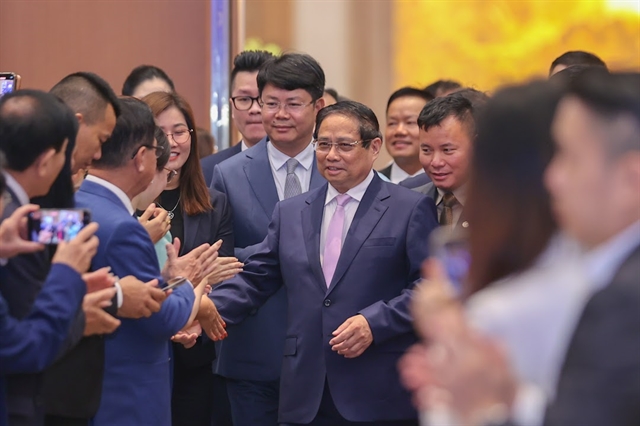The PM emphasised that the resolutions are already comprehensive. The most desired now is to organise implementation effectively, guided by the spirit of ‘thinking deeply and acting boldly.’

HÀ NỘI — All proposals and concerns from enterprises must be answered and resolved within two weeks, directed Prime Minister Phạm Minh Chính while chairing a dialogue with the business community in Hà Nội on Saturday.
The dialogue aimed to promote the effective implementation of the Politburo’s Resolution No. 68-NQ/TW on private economic development, contributing to boosting rapid and sustainable national economic growth.
The Politburo issued Resolution 68 on May 4, 2025, followed by the National Assembly’s Resolution No. 198/2025/QH15 and the Government’s Resolutions 138 and 139/NQ-CP, all focusing on private sector development. According to the Ministry of Finance, these resolutions define objectives, solutions, and assignments, adhering to the six principles of clarity - in responsibilities, tasks, authority, timelines, outcomes, and accountability.
The private sector now contributes around 50 per cent of GDP, 56 per cent of total investment capital, more than 30 per cent of the State budget revenue, and nearly 30 per cent of import-export turnover, according to Minister-Chairman of the Government Office Trần Văn Sơn who announced the Prime Minister's decision to establish the National Steering Committee for the implementation of Resolution 68-NQ/TW.
The PM emphasised that the resolutions are already comprehensive and well-coordinated. The most desired now is to organise implementation effectively, guided by the spirit of ‘thinking deeply and acting boldly.’
It also needs to find the most efficient approaches to unlock the potential of nearly one million enterprises and five million household businesses.
He called for clearly defining the roles and responsibilities of the State, local authorities, businesses and citizens in implementing the resolution.
PM Chính also urged unity and coordination with the spirit: “When the Party has provided direction, the Government is committed, the National Assembly agrees, the people are supportive and the country is hopeful, we only discuss how to act, not whether to retreat.”
Enterprises and business associations expressed their commitment to operating in compliance with the law, fostering business ethics and a healthy business culture, eliminating opportunistic and illegal practices, renewing their business mindset and enhancing their capabilities.
The business community urged the Government to streamline laws, cut red tape, coordinate inspections, and ensure fair access to land, capital, labour, and resources. They also called for greater delegation to private firms, especially in emerging sectors.
They also suggested more tax and fee incentives, stronger protection of legal rights and interests, streamlined complaint-handling mechanisms, and prompt resolution of issues arising during implementation.
“If everyone joins hands with the Government in fully and faithfully implementing the policies that have been set out, I believe all enterprises will grow. That is also a global trend,” Mai Kiều Liên, CEO of Vinamilk, said.
“The State should soon develop and issue a special mechanism for science and technology enterprises in the agricultural sector, including policies on land, credit, tax and training; and amend the Law on Crop Production to align it with other laws,” Trần Mạnh Báo from Thái Binh Seed Group said.
He also suggested establishing innovation support funds and developing a mechanism for cooperation and technology transfer between the public and private sectors.
According to Phạm Nguyễn Toan, vice president of the Việt Nam Real Estate Association, the core spirit is recognising private enterprises as strategic partners of the State for social development.
The new policy no longer views businesses as mere subjects of regulation, but as stakeholders who share responsibility and help shape the future.
"Private enterprises will no longer be bystanders to strategic infrastructure projects. They can become the leading forces executing key national projects if entrusted and empowered with appropriate mechanisms," Toan said.
He added that it is the consistent message of Resolution 68, which encourages the private sector to participate in vital areas if they meet the conditions.
Nguyễn Văn Khôi, president of the Việt Nam Real Estate Association, said the priority is to address institutional bottlenecks and guarantee rights that enable private economic development. For example, it is essential to thoroughly remove administrative procedure obstacles.
PM Chính acknowledged their proposals on simplified procedures, fair access to resources, and clear policy mechanisms to support business development.
He emphasised that State agencies must act as facilitators, focusing on strategy, policy-making, supervision, and post-check.
The Government will continue pursuing the three strategic breakthroughs in institutional reform, infrastructure development, and human resources. It will also ensure sovereignty, political stability, and public order while facilitating business access to land, capital, resources, technology, and skilled labour, and safeguarding property and business rights.
PM Chính instructed all ministries, agencies, and local authorities to establish mechanisms for regular engagement with businesses, including prompt handling of their requests, ensuring that they are responded within two weeks.
He urged stronger connections among public agencies and the private sector, both through direct engagement and digital platforms. He also asked ministries to continuously review and adjust policies in a timely, flexible, and effective manner to better support businesses.
He called for closer collaboration among private firms, foreign investors, and State-owned enterprises to build domestic and global production, supply, and service chains. He expressed his hope that household businesses will evolve into formal enterprises, small firms into large ones, and large enterprises into multinational corporations.
Finally, the Government leader thanked the business community for their social contributions, urging them to further engage in housing development, poverty eradication, and social welfare. He called on them to help build strategic infrastructure, shape policy, and nurture high-quality human capital for a fast-growing, sustainable, and prosperous Việt Nam.— BIZHUB/VNS





